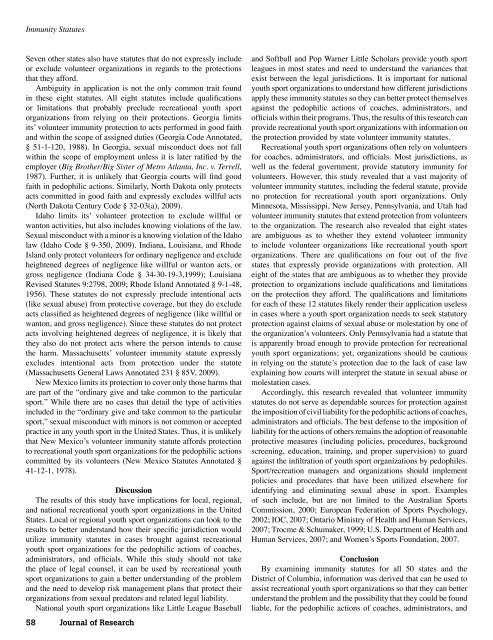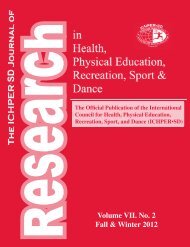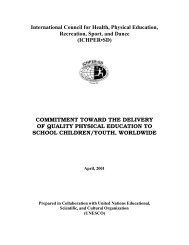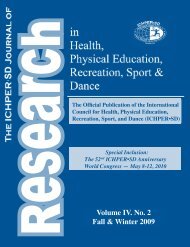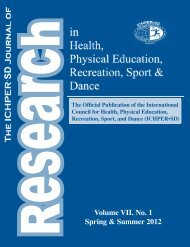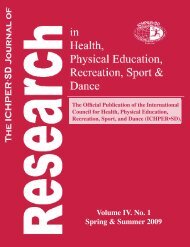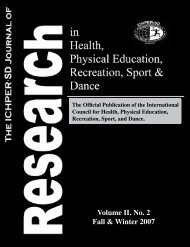Volume V. No. 1 Spring & Summer 2010 - ichperâ¢sd
Volume V. No. 1 Spring & Summer 2010 - ichperâ¢sd
Volume V. No. 1 Spring & Summer 2010 - ichperâ¢sd
Create successful ePaper yourself
Turn your PDF publications into a flip-book with our unique Google optimized e-Paper software.
Immunity Statutes<br />
Seven other states also have statutes that do not expressly include<br />
or exclude volunteer organizations in regards to the protections<br />
that they afford.<br />
Ambiguity in application is not the only common trait found<br />
in these eight statutes. All eight statutes include qualifications<br />
or limitations that probably preclude recreational youth sport<br />
organizations from relying on their protections. Georgia limits<br />
its’ volunteer immunity protection to acts performed in good faith<br />
and within the scope of assigned duties (Georgia Code Annotated,<br />
§ 51-1-120, 1988). In Georgia, sexual misconduct does not fall<br />
within the scope of employment unless it is later ratified by the<br />
employer (Big Brother/Big Sister of Metro Atlanta, Inc. v. Terrell,<br />
1987). Further, it is unlikely that Georgia courts will find good<br />
faith in pedophilic actions. Similarly, <strong>No</strong>rth Dakota only protects<br />
acts committed in good faith and expressly excludes willful acts<br />
(<strong>No</strong>rth Dakota Century Code § 32-03(a), 2009).<br />
Idaho limits its’ volunteer protection to exclude willful or<br />
wanton activities, but also includes knowing violations of the law.<br />
Sexual misconduct with a minor is a knowing violation of the Idaho<br />
law (Idaho Code § 9-350, 2009). Indiana, Louisiana, and Rhode<br />
Island only protect volunteers for ordinary negligence and exclude<br />
heightened degrees of negligence like willful or wanton acts, or<br />
gross negligence (Indiana Code § 34-30-19-3,1999); Louisiana<br />
Revised Statutes 9:2798, 2009; Rhode Island Annotated § 9-1-48,<br />
1956). These statutes do not expressly preclude intentional acts<br />
(like sexual abuse) from protective coverage, but they do exclude<br />
acts classified as heightened degrees of negligence (like willful or<br />
wanton, and gross negligence). Since these statutes do not protect<br />
acts involving heightened degrees of negligence, it is likely that<br />
they also do not protect acts where the person intends to cause<br />
the harm. Massachusetts’ volunteer immunity statute expressly<br />
excludes intentional acts from protection under the statute<br />
(Massachusetts General Laws Annotated 231 § 85V, 2009).<br />
New Mexico limits its protection to cover only those harms that<br />
are part of the “ordinary give and take common to the particular<br />
sport.” While there are no cases that detail the type of activities<br />
included in the “ordinary give and take common to the particular<br />
sport,” sexual misconduct with minors is not common or accepted<br />
practice in any youth sport in the United States. Thus, it is unlikely<br />
that New Mexico’s volunteer immunity statute affords protection<br />
to recreational youth sport organizations for the pedophilic actions<br />
committed by its volunteers (New Mexico Statutes Annotated §<br />
41-12-1, 1978).<br />
Discussion<br />
The results of this study have implications for local, regional,<br />
and national recreational youth sport organizations in the United<br />
States. Local or regional youth sport organizations can look to the<br />
results to better understand how their specific jurisdiction would<br />
utilize immunity statutes in cases brought against recreational<br />
youth sport organizations for the pedophilic actions of coaches,<br />
administrators, and officials. While this study should not take<br />
the place of legal counsel, it can be used by recreational youth<br />
sport organizations to gain a better understanding of the problem<br />
and the need to develop risk management plans that protect their<br />
organizations from sexual predators and related legal liability.<br />
National youth sport organizations like Little League Baseball<br />
58 Journal of Research<br />
and Softball and Pop Warner Little Scholars provide youth sport<br />
leagues in most states and need to understand the variances that<br />
exist between the legal jurisdictions. It is important for national<br />
youth sport organizations to understand how different jurisdictions<br />
apply these immunity statutes so they can better protect themselves<br />
against the pedophilic actions of coaches, administrators, and<br />
officials within their programs. Thus, the results of this research can<br />
provide recreational youth sport organizations with information on<br />
the protection provided by state volunteer immunity statutes.<br />
Recreational youth sport organizations often rely on volunteers<br />
for coaches, administrators, and officials. Most jurisdictions, as<br />
well as the federal government, provide statutory immunity for<br />
volunteers. However, this study revealed that a vast majority of<br />
volunteer immunity statutes, including the federal statute, provide<br />
no protection for recreational youth sport organizations. Only<br />
Minnesota, Mississippi, New Jersey, Pennsylvania, and Utah had<br />
volunteer immunity statutes that extend protection from volunteers<br />
to the organization. The research also revealed that eight states<br />
are ambiguous as to whether they extend volunteer immunity<br />
to include volunteer organizations like recreational youth sport<br />
organizations. There are qualifications on four out of the five<br />
states that expressly provide organizations with protection. All<br />
eight of the states that are ambiguous as to whether they provide<br />
protection to organizations include qualifications and limitations<br />
on the protection they afford. The qualifications and limitations<br />
for each of these 12 statutes likely render their application useless<br />
in cases where a youth sport organization needs to seek statutory<br />
protection against claims of sexual abuse or molestation by one of<br />
the organization’s volunteers. Only Pennsylvania had a statute that<br />
is apparently broad enough to provide protection for recreational<br />
youth sport organizations; yet, organizations should be cautious<br />
in relying on the statute’s protection due to the lack of case law<br />
explaining how courts will interpret the statute in sexual abuse or<br />
molestation cases.<br />
Accordingly, this research revealed that volunteer immunity<br />
statutes do not serve as dependable sources for protection against<br />
the imposition of civil liability for the pedophilic actions of coaches,<br />
administrators and officials. The best defense to the imposition of<br />
liability for the actions of others remains the adoption of reasonable<br />
protective measures (including policies, procedures, background<br />
screening, education, training, and proper supervision) to guard<br />
against the infiltration of youth sport organizations by pedophiles.<br />
Sport/recreation managers and organizations should implement<br />
policies and procedures that have been utilized elsewhere for<br />
identifying and eliminating sexual abuse in sport. Examples<br />
of such include, but are not limited to the Australian Sports<br />
Commission, 2000; European Federation of Sports Psychology,<br />
2002; IOC, 2007; Ontario Ministry of Health and Human Services,<br />
2007; Trocme & Schumaker, 1999; U.S. Department of Health and<br />
Human Services, 2007; and Women’s Sports Foundation, 2007.<br />
Conclusion<br />
By examining immunity statutes for all 50 states and the<br />
District of Columbia, information was derived that can be used to<br />
assist recreational youth sport organizations so that they can better<br />
understand the problem and the possibility that they could be found<br />
liable, for the pedophilic actions of coaches, administrators, and


